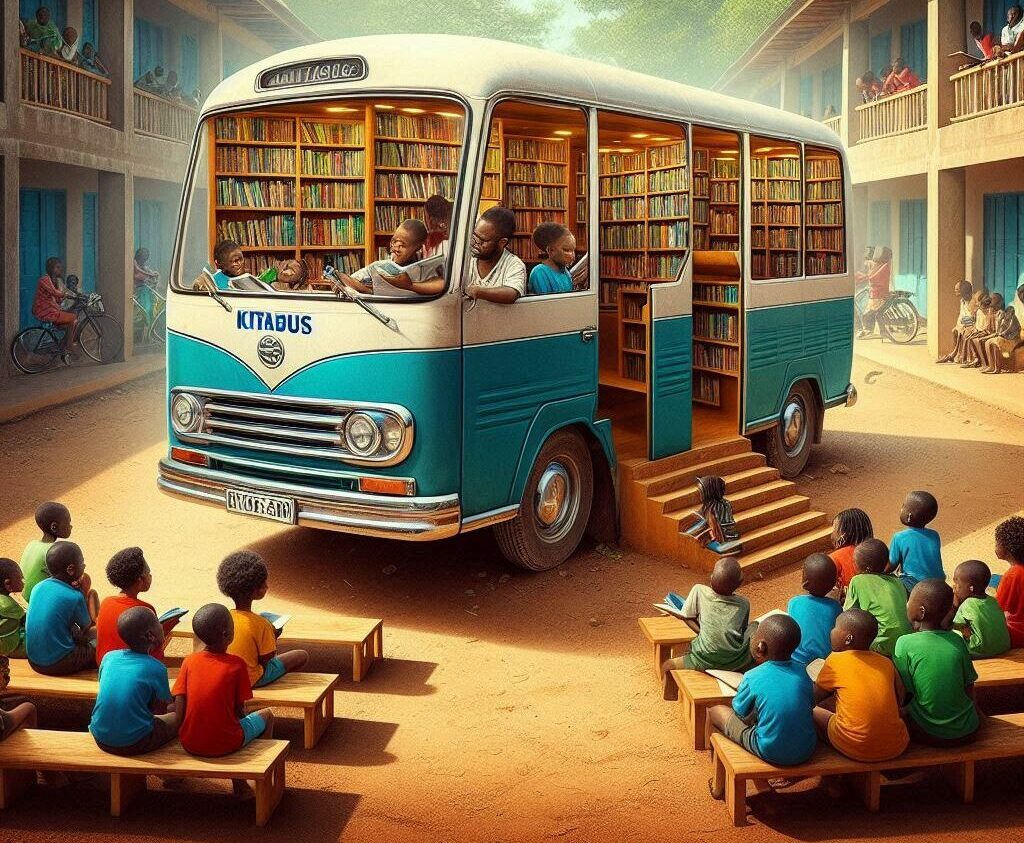
The pleasure of reading
An innovative experiment in the east of the Democratic Republic of Congo
A mobile library is touring the city of Bukavu (eastern DR Congo) to the delight of readers. Bringing books closer to the community is the encouraging experiment that the Kitabus aims to offer.
The Kitabus takes to the road to promote reading
The Kitabus is a mobile library that travels around the city of Bukavu. The bus is equipped with shelves containing a variety of books ranging from novels, fables and mangas to teaching manuals, and a number of seats to enable readers to sit down and enjoy a good book.
The word ‘Kitabu’ means ‘book’ in Swahili, one of the national languages spoken in DR Congo. The ‘Kitabu’ takes to the road and criss-crosses the city to get closer to its readers and becomes a Kitabus.
A look at a difficult context
Public libraries are generally rare in the DRC, particularly outside the big cities. This leaves many people without access to books.
Added to this is the shortage of books in schools and universities, exacerbating the lack of interest in reading.
Many areas are isolated, making it impossible to travel to libraries and access books.
Low incomes prevent people from investing in reading.
The advantages of the Kitabus
As in many parts of the country, in the east access to educational resources is often limited and there is a lack of libraries. The aim of this mobile project is to bring books closer to potential readers. An initiative of the Centre Culturel Français of Bukavu, the Kitabus was born out of the need to bridge the gap between available educational resources and the lack of access to books. It solves the problem of mobility and meets the population’s reading needs.
These vehicles, fitted out as libraries, enable people living in remote areas or with no educational infrastructure to discover the joy of reading.
The aim is to promote education through reading books. In this way, the Kitabus travels from school to school, offering pupils a few hours of leisure time and helping to instil a taste for reading.
The DRC and its great authors
In a country where economic, social and political challenges are omnipresent, books can be windows onto other realities, sources of inspiration and comfort.
The DRC has a rich literary tradition, nurtured by authors whose works have left their mark on the history of African literature.
These include the indisputable Sony Labou Tansi, a writer and playwright whose works tackle themes such as dictatorship, violence and resistance. Paul Lomami Tchibamba‘s stories explore African traditions and social struggles. Fiston Mwanza Mujila, a more contemporary writer, depicts everyday Congolese life with a poetic and incisive pen, and echoes the realities of Kinshasa, a city of contrasts.
Reading and its many benefits
 Much more than a simple intellectual or entertainment activity, reading has a positive influence on the sociological, economic and psychological aspects of societies.
Much more than a simple intellectual or entertainment activity, reading has a positive influence on the sociological, economic and psychological aspects of societies.
Reading allows us to explore different cultures, ways of thinking and realities. In this way, it helps to reduce prejudice and promote tolerance.
In economic terms, reading is a powerful engine for personal and professional development. It enriches cognitive skills, improves vocabulary and strengthens analytical and communication skills.
It also contributes to lifelong learning, enabling people to acquire new skills and adapt to economic and technological change, which is essential in a constantly evolving world.
Psychologically, reading stimulates the brain, encourages concentration, improves memory and delays cognitive decline.
Often offering a moment of calm and relaxation, reading also has the capacity to reduce stress. According to some studies, reading for just six minutes can reduce stress levels by 68%.
Reading in the digital age
While digital and visual media play an increasingly important role in today’s society, the benefits of reading remain undeniable, both individually and collectively.
Reading, often perceived as a simple leisure activity or an individual pleasure, is in reality a powerful tool for personal, social and economic development.
Promoting reading at all ages and in all social strata therefore remains a priority to ensure a more enlightened future.
Despite the logistical and financial challenges, the Kitabus represents a glimmer of hope for a future in which access to knowledge is a right for all.
The project is intended as a tool for children, young people and adults to enhance their skills.
In a country where financial and material resources remain limited, let’s hope that this innovative project succeeds in spreading to other regions and brings reading within everyone’s reach.
Source
Images
- Image digitally created by spazio+spadoni
- Livres · Photo gratuite (pexels.com)
